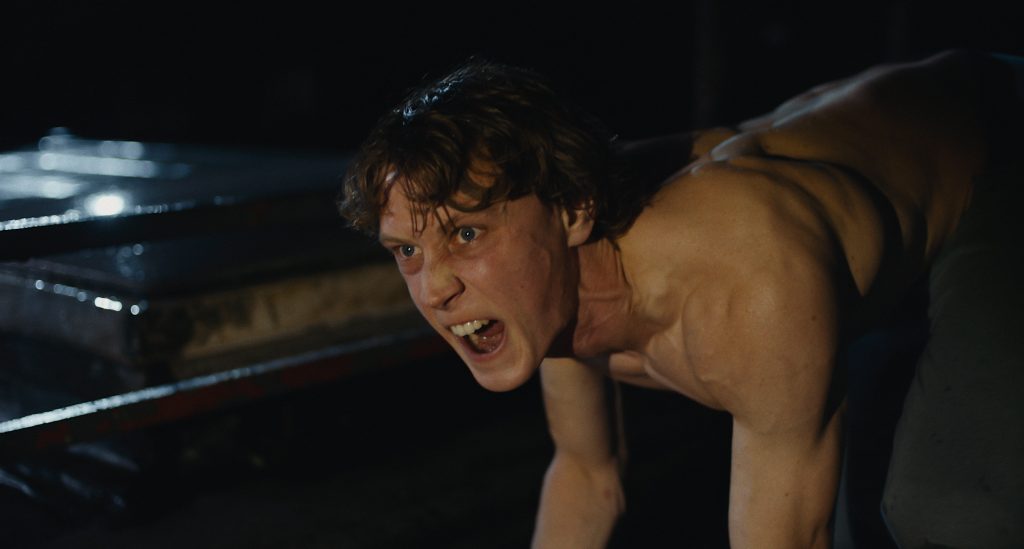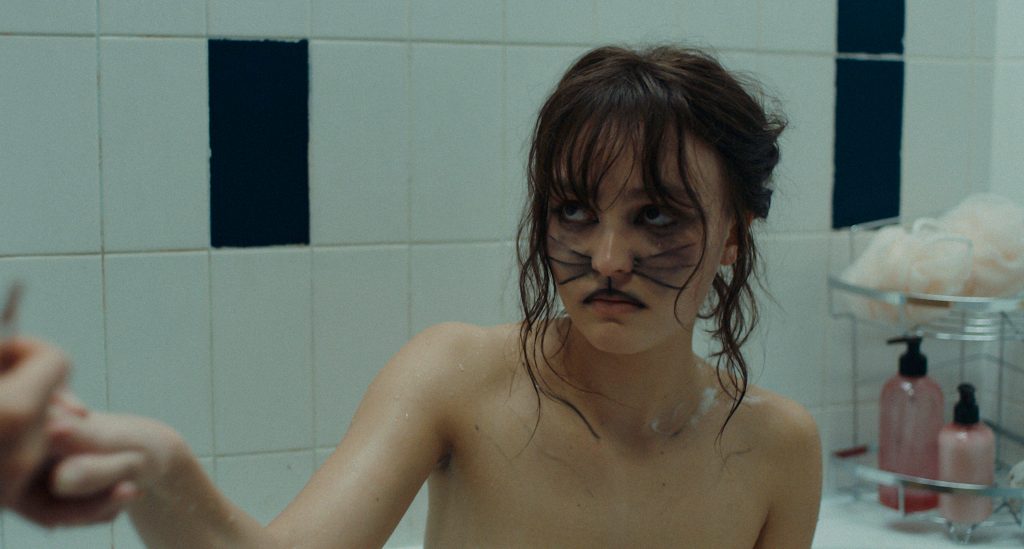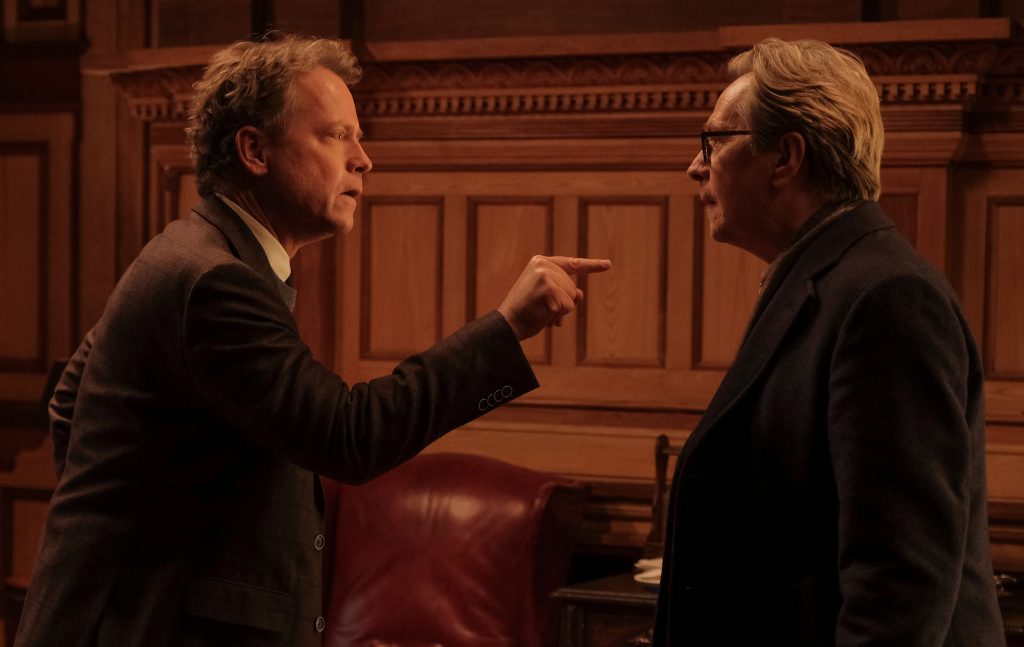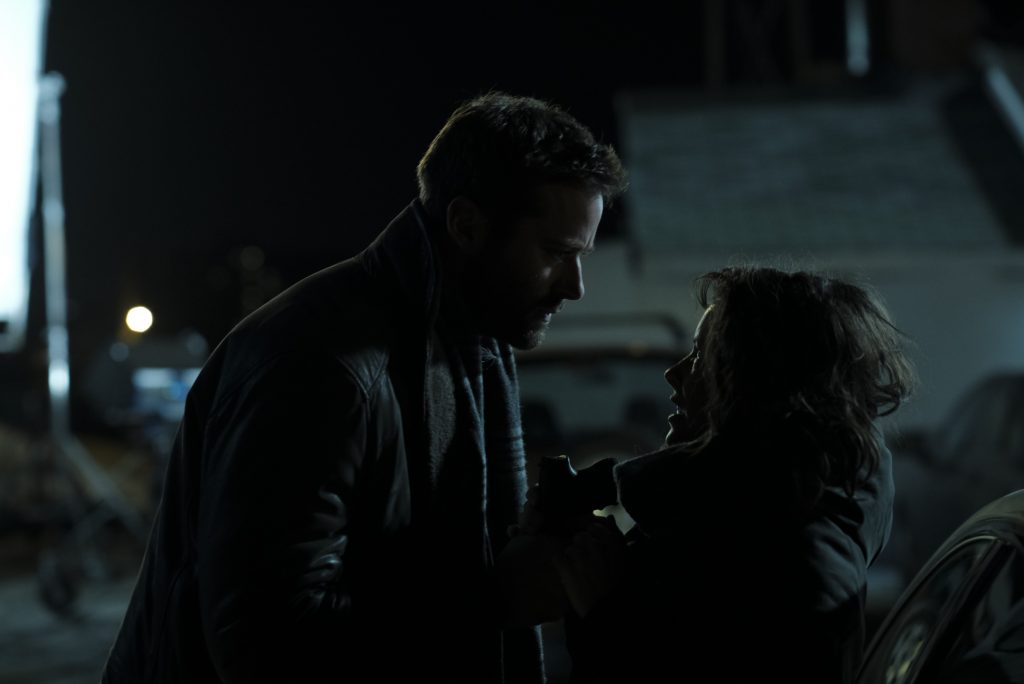December 12, 2021
by Carla Hay

Directed by Nathalie Biancheri
Culture Representation: Taking place in an unnamed part of England, the psychological drama “Wolf” features a nearly all-white cast of characters (with one biracial/black person) representing the working-class and middle-class.
Culture Clash: A young man who thinks he’s a wolf is sent to a psychiatric institution for other young people who think that they are wild animals.
Culture Audience: “Wolf” will appeal primarily to people who are interested in strange and badly bungled movies about people who have mental health issues.

If you want to see an aimless movie where people who think they are wild animals are physically and emotionally abused in a psychiatric institution, then “Wolf” is the movie for you. These scenarios are repeated to the point of extreme irritation, with no character development and no insight into these patients’ personalities and how long they’ve thought of themselves as these wild creatures. In fact, after seeing “Wolf,” viewers will learn almost nothing about the patients in the movie, except how they react to torture methods that are inflicted upon them under the guise of “aversion therapy.” The instutition employees who cause this abuse are equally hollow.
Written and directed by Nathalie Biancheri, “Wolf” is a 99-minute movie that might have been better off as a short film. That’s because the movie’s skimpy plot is just enough for a short film, but most definitely not enough for a feature-length film. Unfortunately, the movie’s misleading trailer makes “Wolf” look like it’s going to be a suspenseful horror film. The only horror that viewers might experience is the horror of knowing that they’re wasting time watching a boring movie that’s trying very hard to be artsy, but it’s really just monotonous and unimaginative.
“Wolf” is the type of movie that is such a turnoff, some viewers probably won’t finish watching it until the very end. Those who watch the entire movie will find out from the underwhelming conclusion that “Wolf” was a confused and badly mishandled concept from the beginning. Although the cast members seem to be giving it their all in their performances, they don’t have much to work with when they have two-dimensional characters to portray.
Let’s start with one of the movie’s biggest flaws: It’s a shoddy portrayal of species dysphoria, the real-life psychiatric disorder where people think they are not human beings but actually belong to another species. The big romance in the film is between two patients who are supposed to have species dysphoria, but they act mostly like humans in a love affair, not the wild creatures that they’re supposed to think they are. This dismissal of their wild creature personas completely ruins the movie’s concept that these two people are supposed to truly believe that they’re wild creatures. There’s no consistency to this movie’s premise, which was flimsy from the start.
The protagonist of “Wolf” is a young man in his late 20s named Jacob (played by George MacKay), who thinks he’s a wolf. In the beginning of the movie, Jacob’s parents drop him off at the unnamed institution with sadness and desperate optimism that Jacob will be “cured” of his delusion that he’s a wolf who’s meant to roam free in a forest. Get used to seeing a shirtless Jacob in several dream-like forest scenes, where he crawls on all fours, sniffs objects around him, and howls with his face thrust up in the air.
The institution appears to be somewhere in the United Kingdom, since most of the patients have British accents, but a few of the patients and employees have American accents. Do not expect to learn anything about Jacob during this movie except that he thinks he’s a wolf. But he somehow forgets he’s a wolf when he sees a pretty young woman in her 20s crawling around outside in the garden area of the institution. Jacob looks at her like a man who is sexually attracted to a woman. Jacob soon finds out that this patient’s name is an American named Cecile (played by Lily-Rose Depp), and she thinks she’s a wildcat.
Since when are wolves sexually attracted to wildcats? And aren’t canines and felines supposed to be natural enemies, especially the wild ones in each species? That tells you all you need to know about how dumb this movie is because it keeps contradicting itself with how “delusional” these characters are supposed to be with their species dysphoria. When Jacob and Cecile begin their inevitable “courtship” (which isn’t spoiler information, because it’s in the movie’s trailer), they talk and act like humans whenever it suits them.
The movie wants to push this idea that Jacob and Cecile are having a “forbidden” odd-couple interspecies romance, but it’s hard to take that idea seriously when Cecile uses her very human hands to pleasure Jacob’s very human private parts while he’s locked up in a cage. Viewers are supposed to believe that wildcats’ natural sexual activities and instincts now magically include “hand jobs”—or is it “paw jobs”? Who knew that a wildcat’s paws can just automatically do the same things that fingers on a human hand can do? Don’t tell that the filmmakers of “Wolf” though, because they want the species dysphoria in this movie to just be just something that characters can put on and take off as easily as a pair of underwear.
Why is Jacob locked up in a cage? It’s his punishment for refusing to admit to the institution officials that he’s a human being, not a wolf. Apparently, this psychiatric institution thinks that the best way to get people to not feel like animals is to put them in an animal cage and treat them like a wild animal. Is it any wonder that their “therapy methods” are failing? It’s just more of this movie’s stupidity on display.
“Wolf” has mind-numbing repetition of Jacob and other institution patients being yelled at, physically abused, and threatened by the institution officials to start acting like humans, or else they’ll get more abuse. The institution also resembles a prison in how there are high fences around the property, and the patients are under supervised lockdown at night. Because “Wolf” is a low-budget film that mainly takes place in or near one building, there’s a relatively small number of people in the cast.
As such, there are really only a few people who are shown to be in charge of the abuse in this hell hole that’s passing itself off as a psychiatric care facility. The most sadistic employee is only identified as the Zookeeper (played by Paddy Considine), a snarling supervisor who sometimes imitates a wild animal too, in order to scare the patients. Considine’s performance is very over-the-top, almost to the point of being unintentionally campy.
If patients really get out of line, they’re sent to the office of the institution’s general manager, Dr. Sullivan, who’s briefly shown in the movie. Dr. Sullivan gives this stern warning to one of the patients who ends up in his office: “You won’t get anywhere by fighting us!” Dr. Sullivan is barely in the movie, so there’s no sense of how long he’s been in charge and which other bureacrats from the institution are making the decisions in how this barbaric place operates.
There’s an unnamed American female staffer (played by Eileen Walsh), who is not as cruel as the Zookeeper, but she’s still abusive and controlling. During the course of the movie, it’s revealed that this female staffer has been some kind of guardian to Cecile, whose parents are either dead or they want nothing to do with her. Cecile’s role in the institution is made even more unclear when she is shown doing employee duties such as janitorial work or work in the kitchen. Later in the story, it’s shown that she has more privileges than the other patients.
Don’t expect any clear answers to questions about Cecile’s background. Just like all the other characters in this movie, her backstory is non-existent, which is one of the main reasons why all of the characters’ personalities are such huge voids. When Jacob asks Cecile how long she’s been at the institution, she replies, “Too long.” When they first see each other, they crawl on all fours, circle each other, and sniff each other like animals. But it’s all just a moronic charade, because during most of the “courtship” between Jacob and Cecile, they definitely act like humans.
In fact, what makes “Wolf” almost laughable is how so much of it looks like an actors’ workshop where people were told to rehearse acting like animals. This phoniness dilutes any terror that the movie might have intended. The “group therapy” sessions consists of people squawking and grunting in a room to mimic the sounds of whatever animal they think they are. Most of the patients are in their late teens or 20s. They include:
- Rufus (played by Fionn O’Shea), who thinks he’s a feral German Shepherd.
- Jeremy (played by Darragh Shannon), who thinks he’s a squirrel.
- Ola (played by Amy Macken), who thinks she’s a spider.
- An unnamed young woman (played by Elsa Fionuir), who thinks she’s a horse.
- Annalisa (played by Karise Yansen), who thinks she’s a panda.
- Judith (played by Lola Petticrew), who thinks she’s a parrot.
- Ivan (played by Senan Jennings), who thinks he’s a duck.
For reasons that aren’t explained, Ivan is the only patient who is an underage child. He’s about 6 or 7 years old, so any cruelty to him is supposed to be more disturbing than what’s inflicted on the older patients. Rufus is the patient who comes the closest to being on the road to “recovery,” so he’s used as an example of being a “model patient.” All that means is that Rufus is predictably going to be used as a snitch if any of the other patients rebel.
The Zookeeper is the one who leads the “aversion therapy” that takes place outdoors in the nearby woods. Some of this “therapy” includes forcing the patients to simulate human hunting of animals. It’s supposed to tap into their human side, as Annalisa explains to newcomer Jacob. When the patients are outdoors, they are often pulled around on leashes or chains.
Another tactic is to try to get the patients to feel pain or nausea for doing things just like their wild animal counterparts. For example, Jeremy is ordered to climb up a tree like a real squirrel would. Some of the Jeremy’s fingernails break off in this futile effort, but he’s still forced to try to climb the tree, even when his fingers start bleeding. When Jeremy stops because of the pain, the Zookeeper exclaims triumphantly: “You see? You’re not really a rodent!”
It should come as no surprise that there are scenes of people eating food that humans aren’t supposed to eat. The “therapy” methods are so counter-productive and ridiculous, viewers already know that this institution doesn’t care about “curing” its patients, because how else would it stay in business if everyone was “cured” and never came back? And because the movie tells so little about the patients, there’s hardly anyone to root for in this clumsily constructed story.
After a patient “graduates” from the institution, there’s a “severance ceremony,” where the patient burns a photo of the animal that they previously identified as. But it all proves to be a very superficial exercise because the “relapse” rate is high. And there are scenes showing that many of the patients say what the officials want to hear, but then go back to their animal ways when none of the officials is looking.
There are hints that people outside the institution know what a terrible place it is. Rufus’ mother (played by Mary Lou McCarthy) storms into the institution one day and insists on taking him out of there when she hears about the abuse. However, the Zookeeper is able to manipulate her into thinking that the institution is her only chance of “curing” Rufus, and she ends up letting Rufus stay there.
In another scene, an unidentified man wearing a pig’s mask throws a rock through a closed window of the institution building while yelling, “Animal freaks!,” and then running away before he can be caught. The people inside the building look on in shock, but then they continue to do what they were doing, as if nothing happened. This vandalism is the only indication that people in the community have fear and loathing of this institution. The institution’s effect on the community could have been an intriguing subplot if explored in a clever way. However, this institutiton seems to be very good at hiding its secrets, because no investigation by law enforcement or social services is ever conducted during this movie.
One of the worst things about “Wolf” is that it’s so heavy-handed with its point that humans can be the worst animals of all. But in sloppily making this point (there are too many plot holes and missing details), Biancheri and the other “Wolf” filmmakers didn’t give much humanity or even a basic personal story to any of the movie’s main characters. And that leaves this movie called “Wolf” as the equivalent of a wild creature that wants to take a savage bite out of society, but in the end is just toothless.
Focus Features released “Wolf” in select U.S. cinemas on December 3, 2021.




